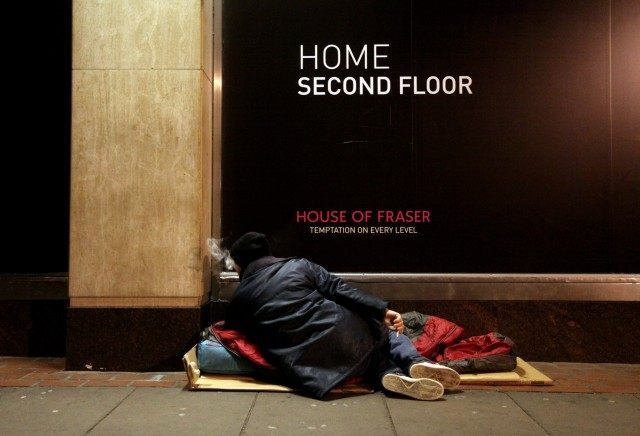“In 2013, an estimated 9,000 ex-servicemen were classified as homeless. Can the Minister update us on how we are getting on with that problem, and what the current statistics may look like?” – a simple enough question about homeless veterans, you might have thought. One which a Conservative Secretary of State for Defence should be able to answer without too much trouble. Think again.
“The Ministry of Defence does not collect figures on homelessness. However, it is a matter that we take very seriously, and I would be delighted to look into the matter and get back to the hon. Gentleman,” replied Parliamentary Under-Secretary of State for Defence Mark Lancaster to Liberal Democrat MP John Pugh at Defence Questions yesterday.
The amazing thing is that the Ministry of Defence should not be surprised by the question. As Pugh suggested, the number of homeless veterans has been spoken of for some time. The figure of 9,000 comes from a Mirror article in 2013, which itself seems to have referenced information given to it by the charity Homes 4 Heroes.
That homeless veterans is an issue is not in question. There is a proliferation of groups involved in assisting former servicemen. Charities such as Care After Combat, The Royal British Legion and Soldiers Off The Street join the likes of Homes 4 Heroes to provide help with clothing, food and rehabilitation and give advice on Post Traumatic Stress Disorder, alcoholism, drug abuse, housing and employment – everything involved in the transition from military to civilian life.
What is questioned is the number itself. The homelessness charity Crisis told a Guardian writer it was “nonsense” to suggest there were almost 10,000 homeless veterans sleeping on the streets. They have also been cited as evidence that one in four rough sleepers are ex servicemen. A Crisis press release from November 2000 stated “100,000 homeless ex-servicemen – equivalent to the population of Dover” were homeless and “bedding down in hostels, B&Bs, squats, on friends’ floors and even on the streets”.
Even allowing for discrepancies in the number, the government promises that in return for sacrificing civilian freedoms, facing danger and sometimes suffering serious injury, ex-servicemen can expect a level of assistance. The Armed Forces Covenant was enshrined in law in 2011. It states:
“Support should be available for all service personnel in order to assist their transition from service to civilian life.
“Provision should include training, education, appropriate health care referral and job-finding preparation and assistance. It should also include information, advice and guidance on such matters as housing and financial management.”
Until the Ministry of Defence can properly enumerate the most vulnerable ex-servicemen it will not be able to meet the terms of its own Armed Forces Covenant. The fact the issue has been spoken about for well over a decade with little or no progress suggests such neglect of duty on behalf of several governments that one is forced to ask whether they even care.

COMMENTS
Please let us know if you're having issues with commenting.